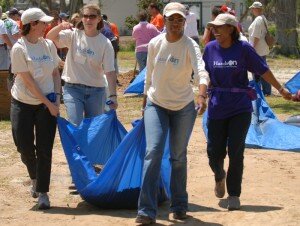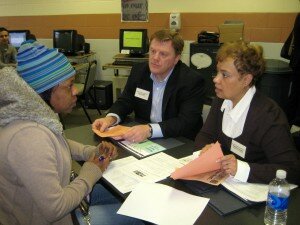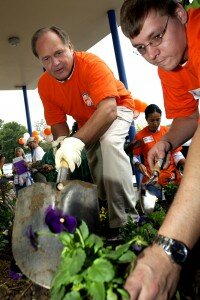This post originally appeared on The Huffington Post on November 30, 2011. Today’s guest post was written by Uma Viswanathan who is the program director of Nouvelle Vie Haiti, International Association for Human Values. She has lead many youth and adult workshops ranging from stress management to trauma-relief. She received her M.A. in History of Science from Harvard University.
program director of Nouvelle Vie Haiti, International Association for Human Values. She has lead many youth and adult workshops ranging from stress management to trauma-relief. She received her M.A. in History of Science from Harvard University.
It’s early November, and I’m sitting in the vast auditorium at UniNorte University in Barranquilla, Colombia, listening to Accion Social present on Colombia’s extreme poor at the International Association for Volunteer Empowerment (IAVE)’s World Youth Summit. Lesly sits across the aisle from me, now a leadership and empowerment trainer through Nouvelle Vie. His back is straight as he leans forward, staring intently at the PowerPoint presentation, listening carefully to the English translation on his headphones. “Imagine living in a small one-room house with no running water, no electricity, struggling to eat every single day,” says the speaker. This exercise is not much of a stretch for Lesly’s imagination.
Lesly and I have been invited to the conference to speak on sustainable development through personal transformation. It is the first time Lesly, age 29, has ever left Haiti. It is the first time he has experienced an environment that has smooth clean roads, shiny university buildings, and steady access to electricity and internet. Putting myself in his shoes, I can understand why the vast majority of young adults from developing countries escape to wealthier countries, never to return home.
“What did you think of the presentation?” I ask him as we leave the auditorium.
“I never knew that poverty existed outside of Haiti,” he says.
He sounds uplifted, somehow.
“People everywhere are suffering, but people everywhere are also helping. I’m not alone. We’re all in this together, helping each other rise above this.”
“How do feel when you come to a country and interact with people who have so much?” I ask him later that evening. We are walking around the pool at the Hotel del Prado, a beautiful sprawling 18th century colonial hotel.
Lesly pauses thoughtfully. “Every country has its strengths. Some are material. Some are not. I don’t worry about it. What I do know is that my real strength lies in my own mind. There are people all over the world who are unhappy and who feel powerless to do something about it. But I know that if my mind is on what I don’t have, I am powerless. When I volunteer, when I think about what I can give to others, I realize how much I do have.”
It’s easy for someone like me to volunteer. I grew up in Westchester, an affluent suburb of New York, went to a great university, and live in a warm, comfortable house with a steady supply of healthy food, clean water and electricity. But what does it mean for Lesly to volunteer? What does it mean when some of the world’s poorest people volunteer?
Volunteering or selfless service is a frame of mind. It is an attitude of continually working to improve lives and the environment around you, without demanding or expecting reward.
Most people don’t expect the poor to volunteer. How can people who don’t have their basic needs taken care of think beyond their own survival? How can they have the frame of mind to care about the needs of those around them? The burden of responsibility for taking care of one’s neighbor typically falls onto civic, humanitarian or religious institutions. But what happens when these systems fail, as they usually do, due to corruption or poor planning or lack of funds? Blame. Frustration. Powerlessness. Hopelessness. Revolt.
Unless the communities that typically receive services begin to serve, to stretch more than just their hands but their own hearts, they cannot experience the power they have to transform their own lives and own communities.
Being a volunteer, serving selflessly, is a position of power. It moves you from being a victim to being an agent of change. It makes you unshakable. Because your actions are driven by inspiration, not external motivation, you do not wait for someone to guide you or reward you. The moment you stop waiting, stop complaining, stop blaming, and start taking responsibility for the life and people around you, you begin to grow. And the seed for innovation and creative problem-solving is planted in local leaders.
Jobs aren’t available in Haiti, like in many countries with struggling economies. But that doesn’t mean that communities have to wait for a job in order to address their own needs. Like Lesly, they can grow their own food from saved seeds and compost on their rooftops. They don’t have to wait for an international health worker to run a workshop for them on the use of condoms. Like Lesly, they can develop peer sexuality workshops to explore the reasons why they are escaping their lives through sex, which leads to rampant AIDS and unwanted pregnancy. And when the resources come from the outside and are created from within, when more training and opportunities come, the community will know who should be in charge. The new leaders will already be in place to use these resources wisely, to expand and grow what has already started.
Selfless service is a practice that reinforces a set of human values that transcend culture, religion, and nationality. It builds leaders who will find a way to serve their community whether we invest in them or not. Educational background, technical skills or knowledge, though necessary, are not enough to create successful local leadership. They must be coupled with the nurturing of human values and an ethic of service.
If we are waiting for leaders and entrepreneurs to rise up out of communities, we need to raise the bar and support programs that train and support individuals to serve their own communities, not just because they may create jobs for themselves and others. We need to support people who feel so much responsibility for their communities that they must serve, and solve problems in integrated, holistic ways.
“When will we stop asking for money from the World Bank and asking for aid from NGOs and foreigners?” asked Samson, one of Lesly’s fellow Nouvelle Vie youth leaders, at the World Bank Summit on youth leadership with the Haitian government last fall. “When will we do this on our own?”
This is the attitude with which, in concert with the growing global networks of financial and support, leaders will pave their own communities’ way out of poverty.
On the way to the airport, I ask Lesly how he feels about returning back to Haiti. He responds: “I was born where I was born so that I could serve Haiti. I can now give to Haiti a vision of something bigger.”
 At the end of a service project, it’s important to take a few moments to reflect on the work that everyone has done and how that work has impacted the people being served. Whether it’s a park cleanup, a bake sale fundraiser or packing emergency kits for a local nonprofit.
At the end of a service project, it’s important to take a few moments to reflect on the work that everyone has done and how that work has impacted the people being served. Whether it’s a park cleanup, a bake sale fundraiser or packing emergency kits for a local nonprofit.
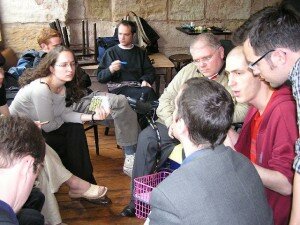 How do you communicate the value of a service event by connecting it with the bigger picture? Reflection helps you see how your service – and the service of other volunteers working with you – has benefited the community. Through reflection, you can think about your commitment, the work you did, how it affected you, the impact it made on the community, and future actions you can take to continue to change your world.
How do you communicate the value of a service event by connecting it with the bigger picture? Reflection helps you see how your service – and the service of other volunteers working with you – has benefited the community. Through reflection, you can think about your commitment, the work you did, how it affected you, the impact it made on the community, and future actions you can take to continue to change your world. Family & Women’s Services
Family & Women’s Services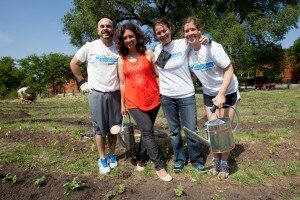 Volunteers give so much to the causes they serve. It’s no surprise that volunteers are also benefiting from their time spent in service! As you give your time and skills, you will find new people, skills, connections, and perspectives. Read on for a few rewards and opportunities that come to those who reach out in service.
Volunteers give so much to the causes they serve. It’s no surprise that volunteers are also benefiting from their time spent in service! As you give your time and skills, you will find new people, skills, connections, and perspectives. Read on for a few rewards and opportunities that come to those who reach out in service.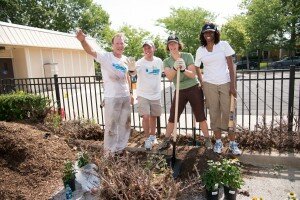 Volunteering helps you develop great friendships. It takes an extraordinary person to love a stranger enough to give your time and skills to them. Some volunteers find that the quality of people they met while volunteering is higher than anywhere else; there is something intrinsically special about people who volunteer.
Volunteering helps you develop great friendships. It takes an extraordinary person to love a stranger enough to give your time and skills to them. Some volunteers find that the quality of people they met while volunteering is higher than anywhere else; there is something intrinsically special about people who volunteer.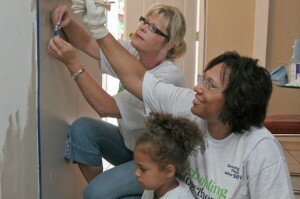 Without volunteers, most non-profit organizations would cease to exist or suffer a drastic reduction in capacity to serve communities and achieve the organization’s mission. Therefore, a refresher course in basic volunteer management is always in order! The way you plan your service projects will significantly affect the success of your volunteer recruitment. The best way to increase your volunteer base is to retain current volunteers; retention is simply a matter of making volunteers feel good about themselves and their service. Class is now convened! Read on for a few key volunteer management reminders.
Without volunteers, most non-profit organizations would cease to exist or suffer a drastic reduction in capacity to serve communities and achieve the organization’s mission. Therefore, a refresher course in basic volunteer management is always in order! The way you plan your service projects will significantly affect the success of your volunteer recruitment. The best way to increase your volunteer base is to retain current volunteers; retention is simply a matter of making volunteers feel good about themselves and their service. Class is now convened! Read on for a few key volunteer management reminders.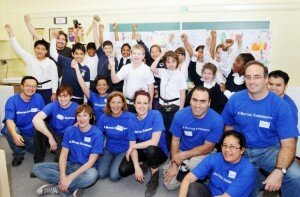 Why do you volunteer? That’s the question we all want the answer to, as it varies so much from person to person. We collect stories, read studies, and browse charts & infographics in pursuit of the common theme. We love volunteers and never tire of hearing the inspiration behind the time and effort they give to the causes and organizations they are passionate about.
Why do you volunteer? That’s the question we all want the answer to, as it varies so much from person to person. We collect stories, read studies, and browse charts & infographics in pursuit of the common theme. We love volunteers and never tire of hearing the inspiration behind the time and effort they give to the causes and organizations they are passionate about. Volunteering and helping our fellow man has long been seen as an altruistic thing to do. But more selfish motives–pleasing friends, doing what you want–are more successful causes of effective volunteering! Regardless of motive, volunteering improves the health, happiness, and in some cases, the longevity of volunteers. Children who volunteer are more likely to grow up to be adults who volunteer. Even unwilling children who are forced to volunteer fare better than kids who don’t volunteer. Communities with lots of volunteers are more stable and better places to live, which in turn further boosts volunteerism.
Volunteering and helping our fellow man has long been seen as an altruistic thing to do. But more selfish motives–pleasing friends, doing what you want–are more successful causes of effective volunteering! Regardless of motive, volunteering improves the health, happiness, and in some cases, the longevity of volunteers. Children who volunteer are more likely to grow up to be adults who volunteer. Even unwilling children who are forced to volunteer fare better than kids who don’t volunteer. Communities with lots of volunteers are more stable and better places to live, which in turn further boosts volunteerism.
 an
an  service will be felt long after we have left. During “AmeriCorps Works” week, I invite you to think back and remember your own “aha!” moment. What is your purpose and direction in the service field? How do you feed the need to impact others in a positive way? Take some time to refocus on that moment and the resulting actions; it can only increase your commitment to service!
service will be felt long after we have left. During “AmeriCorps Works” week, I invite you to think back and remember your own “aha!” moment. What is your purpose and direction in the service field? How do you feed the need to impact others in a positive way? Take some time to refocus on that moment and the resulting actions; it can only increase your commitment to service!